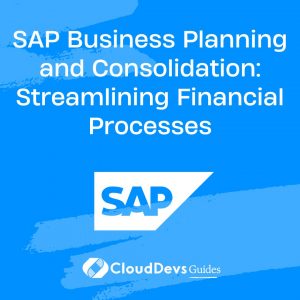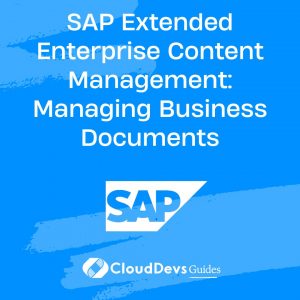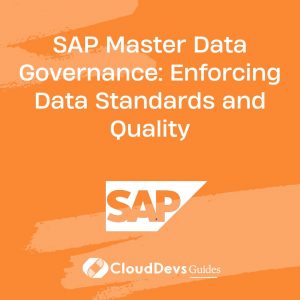SAP Business Planning and Consolidation: Streamlining Financial Processes
In today’s fast-paced business environment, effective financial planning and consolidation are critical for an organization’s success. Companies need to make informed decisions, allocate resources efficiently, and ensure compliance with ever-evolving regulations. SAP Business Planning and Consolidation (BPC) is a powerful solution that can help streamline financial processes, providing businesses with the tools they need to thrive in a competitive landscape.
1. The Importance of Financial Planning and Consolidation
Financial planning and consolidation involve the management of an organization’s financial data to make strategic decisions, allocate resources, and report on performance. These processes are vital for several reasons:
1.1. Informed Decision-Making
Financial planning allows organizations to set clear objectives and create a roadmap for achieving them. By analyzing historical data and market trends, businesses can make informed decisions about investments, cost management, and revenue generation.
1.2. Resource Allocation
Efficient allocation of resources, such as capital, labor, and materials, is essential for optimizing operations and maximizing profitability. Financial planning helps organizations allocate resources where they are needed most.
1.3. Compliance and Reporting
Regulatory bodies require accurate and timely financial reporting. Failure to comply with regulations can lead to legal issues and damage a company’s reputation. Financial consolidation ensures that financial data is accurately collected, validated, and reported.
1.4. Performance Monitoring
Monitoring financial performance is crucial for identifying strengths and weaknesses within an organization. Regular financial reporting and analysis enable businesses to make necessary adjustments to improve performance.
2. Challenges in Financial Planning and Consolidation
Despite the importance of financial planning and consolidation, many organizations face challenges in these areas. Common challenges include:
2.1. Data Complexity
Financial data is often spread across multiple systems, making it difficult to consolidate and analyze. Data complexity can lead to errors and delays in the financial reporting process.
2.2. Manual Processes
Many organizations still rely on manual data entry and spreadsheet-based solutions for financial planning and consolidation. These processes are time-consuming and error-prone.
2.3. Lack of Integration
Disconnected systems and data silos hinder the seamless flow of financial information. This lack of integration can lead to discrepancies and inefficiencies.
2.4. Compliance Risks
Meeting regulatory requirements can be challenging without a robust consolidation and reporting system. Non-compliance can result in financial penalties and damage to a company’s reputation.
3. SAP Business Planning and Consolidation (BPC) – A Solution for Streamlining Financial Processes
SAP BPC is a comprehensive solution designed to address the challenges associated with financial planning and consolidation. It offers a wide range of features and benefits that can transform your organization’s financial processes.
3.1. Unified Platform
SAP BPC provides a unified platform for financial planning, budgeting, forecasting, and consolidation. With all your financial data in one place, you can eliminate data silos and improve data accuracy.
3.2. Integration with SAP and Non-SAP Systems
SAP BPC seamlessly integrates with other SAP solutions and non-SAP systems, ensuring that you can access all your financial data from a single source. This integration simplifies data collection and reporting.
3.3. Automation and Workflow
SAP BPC automates many financial processes, reducing the need for manual data entry and calculations. This automation not only saves time but also reduces the risk of errors.
3.4. Real-time Reporting and Analytics
With SAP BPC, you can access real-time financial data and generate reports and analytics instantly. This capability empowers your organization to make data-driven decisions promptly.
3.5. Compliance and Security
SAP BPC helps ensure compliance with financial regulations by providing built-in controls and audit trails. Your data is also secure with role-based access controls and encryption.
3.6. Scalability
SAP BPC is scalable and can grow with your organization. Whether you are a small business or a large enterprise, SAP BPC can accommodate your financial planning and consolidation needs.
4. How SAP BPC Streamlines Financial Processes
Let’s explore some key ways in which SAP BPC streamlines financial processes with code samples and examples.
4.1. Automated Data Collection
SAP BPC allows you to automate the collection of financial data from various sources, such as ERP systems, spreadsheets, and external databases. This automation reduces the risk of manual errors and ensures data accuracy.
python # Example of automated data collection in SAP BPC data_import = bpc.import_data(source_systems=['SAP ERP', 'Excel'], data_period='2023 Q3')
4.2. Dynamic Budgeting and Forecasting
With SAP BPC, you can create dynamic budgets and forecasts that take into account changing market conditions. The system can automatically adjust forecasts based on real-time data.
python # Example of dynamic budgeting in SAP BPC dynamic_forecast = bpc.generate_dynamic_forecast(scenario='Market Expansion', start_date='2023-01-01', end_date='2023-12-31')
4.3. Consolidation and Elimination
SAP BPC simplifies the consolidation process by providing pre-built templates and automated elimination rules. This streamlines the creation of consolidated financial statements.
python # Example of consolidation in SAP BPC consolidated_statement = bpc.generate_consolidated_statement(scenario='Year-end', currency='USD')
4.4. Real-time Reporting
SAP BPC offers real-time reporting capabilities, allowing you to generate financial reports instantly. You can create customized dashboards and reports to visualize your data effectively.
python # Example of real-time reporting in SAP BPC financial_dashboard = bpc.create_dashboard(report_type='Profit and Loss', date_range='2023')
4.5. Collaboration and Workflow
SAP BPC includes collaboration features that enable multiple stakeholders to work on budgets, forecasts, and reports collaboratively. Workflow management ensures that tasks are completed efficiently.
python # Example of collaboration and workflow in SAP BPC workflow_task = bpc.create_workflow_task(task_name='Budget Approval', assign_to=['Finance Team'], due_date='2023-11-15')
Case Study: How Company XYZ Streamlined Financial Processes with SAP BPC
To illustrate the real-world impact of SAP BPC, let’s take a look at a fictional case study involving Company XYZ.
Background
Company XYZ is a medium-sized manufacturing company with operations in multiple countries. They were facing challenges in their financial planning and consolidation processes, including:
- Manual data collection from different subsidiaries.
- Lengthy and error-prone consolidation processes.
- Lack of real-time visibility into financial data.
Solution
Company XYZ implemented SAP BPC to streamline their financial processes. Here’s how they benefited:
- Automated Data Collection: They automated data collection from various subsidiaries and integrated it into SAP BPC, reducing the time spent on data entry.
- Real-time Reporting: SAP BPC provided real-time visibility into financial data, enabling the finance team to generate reports and forecasts on-demand.
- Consolidation: The consolidation process became more efficient, with automated elimination rules ensuring accuracy.
- Dynamic Forecasting: Company XYZ used SAP BPC’s dynamic forecasting capabilities to adjust their budgets and forecasts based on changing market conditions.
- Compliance: The built-in controls and audit trails in SAP BPC helped Company XYZ ensure compliance with financial regulations.
Results
By implementing SAP BPC, Company XYZ achieved the following results:
- Reduced the time spent on financial processes by 30%.
- Improved data accuracy, reducing errors in financial reporting.
- Enabled timely and data-driven decision-making.
- Streamlined collaboration among finance teams in different regions.
Conclusion
SAP Business Planning and Consolidation (BPC) is a powerful solution that can revolutionize your organization’s financial processes. Whether you’re a small business or a large enterprise, SAP BPC offers the tools and capabilities you need to streamline financial planning, consolidation, and reporting. By automating manual processes, providing real-time data visibility, and ensuring compliance, SAP BPC empowers your organization to make informed decisions and achieve financial success in today’s competitive landscape.
If you’re ready to take your financial processes to the next level, consider implementing SAP BPC and unlock the full potential of your organization’s financial data. Say goodbye to manual data entry, errors, and delays, and embrace a streamlined and efficient financial future with SAP BPC.
Table of Contents









